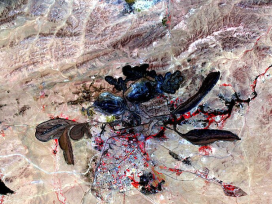In ‘Soundings’: environmental justice and the failure of neoliberal regulation; littered space and the emergency in Low Earth Orbit; Dipesh Chakrabarty on the global of global warming; and Paul Gilroy on the creolized planet.
‘The COP system is broken. It has failed, year on year, to deliver the necessary action within the time frame that’s required, pointing towards a wider system of international governance that is unfit for the purpose in this time of interconnected crises’. Introducing the new issue of Soundings, entitled ‘Planetary imagination’, guest editor Ashish Ghadiali is unremittingly pessimistic about the ability of the COP negotiations to bring the necessary progress.
‘On climate finance, we will hear great fanfare about proposals to come good on a 12-year-old (broken) commitment by the world’s wealthiest countries to deliver $100 billion a year in finance for mitigation against and adaptation to the effects of climate change. There will, however, be little recognition of the extent to which this commitment is woefully short of what is needed: in just the last two years, the global costs of climate-related loss and damage alone have risen to in excess of $150 billion a year, creating a deficit that continues to impose the burden of cost on those with the least resources to mitigate against these impacts, those who also bear the least historic responsibility for causing climate change.’

Environmental justice
COP26 lists collaboration as one of its main objectives. All views are seemingly welcome. And yet environmental justice, the law-making that should speak for Indigenous people, isn’t on the table, writes Sakshi. If laws and legal action remain static, based on corporate culpability after the fact to the exclusion of motive and context, how will future environmental plunder ever be avoided?
‘Even in places where there is discernible environmental and regulatory compliance by mining corporations, it is intrinsic to the operation of extractive capitalism to colonize land and disregard the plurality and diversity of the lives and knowledge forms of its local inhabitants. Lands where Indigenous people have lived since before the existence of modern states possess intricate networks of relationships and cosmologies. None of the regulations devised to fulfil a neoliberal model of procedural fairness can address the complexities of immanent relationships with the land and resources.’
The potential for greater legal regulation has been proven by the Supreme Court of Panama on Indigenous Rights’ ruling, and by recent legal challenges to the Brazilian government’s failure to meet its environmental responsibilities. But ‘until there is a larger reconciliation project that addresses the foundational premise that enables these erasures, tradeoffs, and disregard for the plurality of living worlds, the assertion of “never again”, and the justice discourses within settler colonies, will have little meaning or impact. A sustainable future based on hope and justice will only result from collaborating and working together in the juridical, political and social spheres.’
Littered space
Space debris has reached alarming proportions and is growing at a frightening pace, because of the expanding number of satellites circulating in Low Earth Orbit, designed to increase global Internet coverage and provide earth observation data. It is time to completely overhaul the 1967 Outer Space Treaty, writes Susmita Mohanty. The COP forum should therefore include the near-earth environment within its concept of the earth’s climate, enabling the UN to acknowledge, as a collective, the growing menace of human-made debris in near-earth space, and, in partnership with the UN-Outer Space Affairs Office (UN-OOSA), call for a new declaration on LEO.
‘In the absence of binding international treaties, unilateral and unfettered commercial exploitation of outer space resources is almost certain to happen’, writes Mohanty. ‘Twenty first century space governance needs farsighted and enforceable laws, traditional wisdom, planetary ethics, and real-time and reliable data about orbital traffic, if we are to ensure the safety, security and sustainability of space operations in the face of the growing number of space actors, space objects, space debris and adverse space weather phenomena. We are in a state of planetary emergency, both on and off the planet.’
The idea of the planetary
The notion of the planetary allows us to distinguish between the global of globalization and the global of global warming, argues Dipesh Chakrabarty in an interview with Ashish Ghadiali. Globalization is the process through which humans created the world we live in, how we converted the planet into a spherical human domain, at the centre of which are the human stories of technology, empires, capitalism and inequality. Global warming is what has resulted at the planetary level as intensified human consumption of the globe’s resources has turned humanity into a geological agent of change.
The ‘global’ is 500 years old, while the ‘planetary’ is as old as the age of the earth. The physical world has its own deep history: over time it has experienced profound changes. If climate change is to be addressed this mutability must be recognized – the unchanging nature of the world can no longer be taken for granted.
The interview covers the rise of atmospheric sciences during the Cold War, when the Earth became, effectively, part of a comparative study of planets; the relationship between Marxism and the idea of ‘deep history’; the human-made ecological disaster of bush-fires in Australia; the influence of Rohith Vemula and Rabindranath Tagore on planetary thinking and ideas about connectivity; biopower, ZOE and the pandemic; and the difficulty of thinking politically about deep history.
A creolized planet
In conversation with Femi Oriogun Williams, Paul Gilroy reflects on stories of hybridity within the English folk music tradition that in turn suggest the role of art and artists as essential agents of decoloniality, quietly dismantling the perceived certainties of empire and race as they are embedded in the structures that surround us, pointing us, instead, towards an experience of the planetary abundance that lies beyond.
Gilroy discusses the cosmopolitanism of musicians, and their appetite for music that operates across cultural and national boundaries; the plasticity, pliability and nomadic aspects of musical forms mean that Nina Simone can make a song by Sandy Denny her own, and Kathryn Tickell can experiment with South Asian sources; it allows songs to appear in many different versions, as with ‘The Lakes of Pontchartrain’. The folk traditions of the Atlantic world exhibit all of the recombinant cultural DNA that went into them. This creates the possibility of reading the culture of the Atlantic world, North and South, with the idea of a Creole culture – and the possibility of thinking with a creolized planet in mind.
This article is part of the 17/2021 Eurozine review. Click here to subscribe to our weekly newsletter to get updates on reviews and our latest publishing.
Published 3 November 2021
Original in English
First published by Eurozine
© Eurozine
PDF/PRINTPublished in
Newsletter
Subscribe to know what’s worth thinking about.
Related Articles

Literary expressions of grief across the ages use representations of nature as soothing metaphors. But rarely does the death of non-human life merit a thanatography. Could literature that finds a non-anthropomorphic means to grieve for other sentiment beings provide our desperately needed resensitization to the natural world?

Property development pushed on green space in Bucharest has become comparable with the drugs market for profitability. Investigating the trail of questionable ownership rights since post-communist retrocession reveals acts of corruption and intimidation. Can parkland – a prerequisite for urban health and well-being, climate-change reduction and biodiversity – be saved from more illegal fires?








